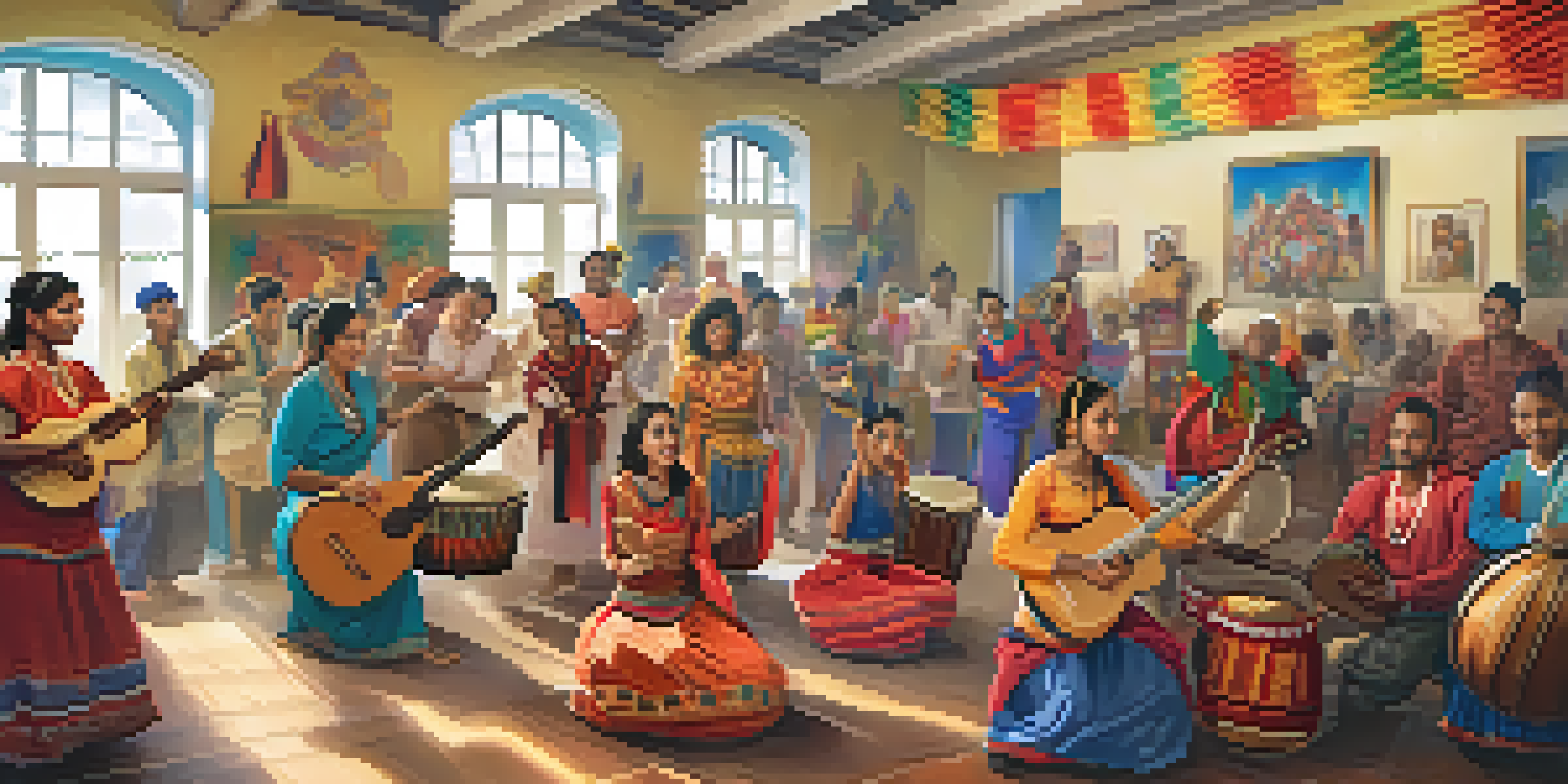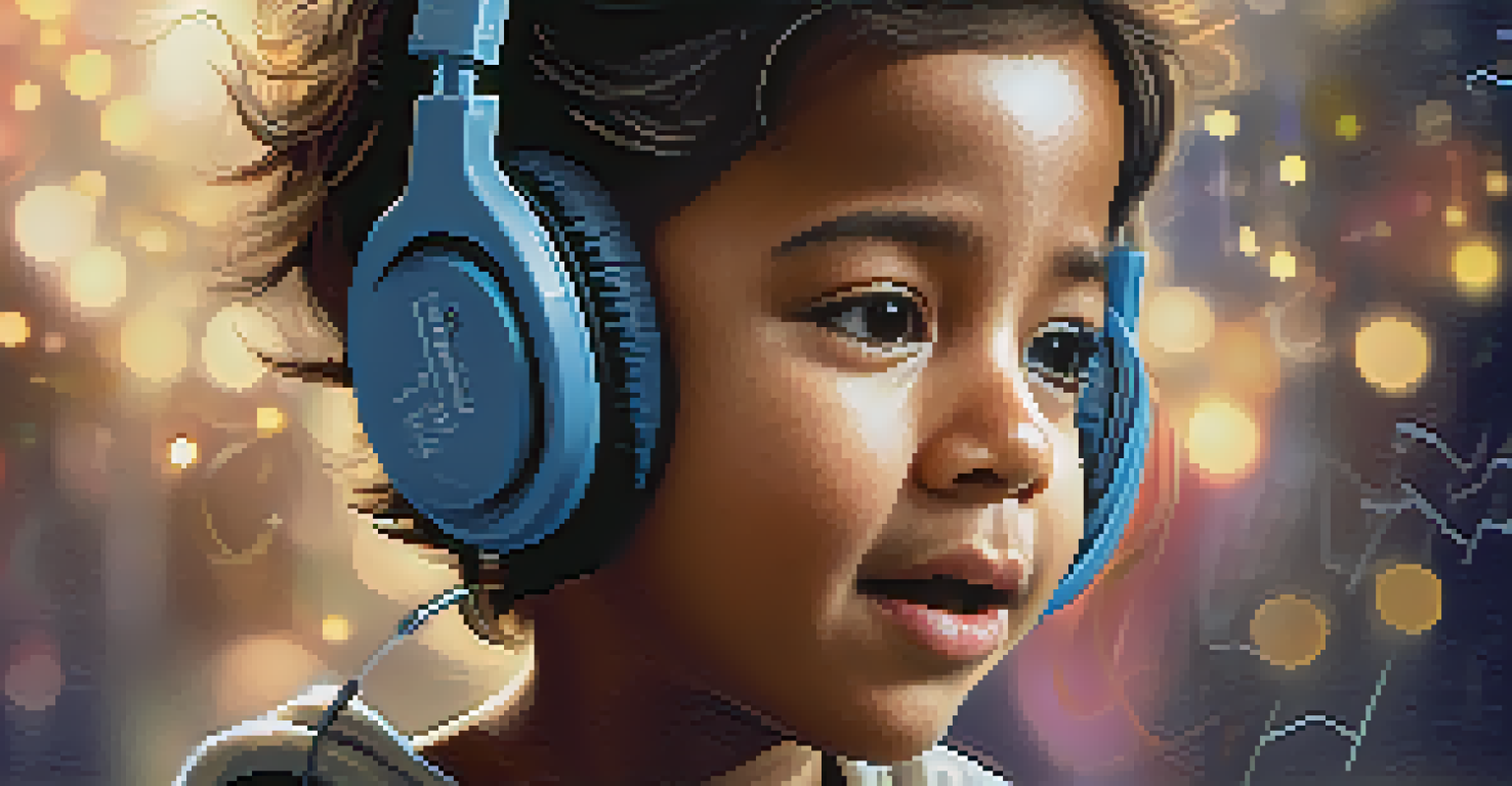The Role of Music in Refugee and Migration Movements

Music as a Source of Identity for Refugees
For many refugees, music serves as a powerful reminder of home and cultural roots. It connects them to their identity and heritage, even when they're far away. Traditional songs and melodies can evoke memories of family gatherings, celebrations, or everyday life in their homeland.
Music can change the world because it can change people.
This connection to music often helps refugees maintain a sense of self amidst the chaos of displacement. It’s almost like a comforting blanket, wrapping them in familiar sounds during turbulent times. By preserving their cultural music, they can share their stories and experiences with others.
Moreover, music can foster community among refugees, as shared songs create bonds and a sense of belonging. Whether it's singing together at a camp or listening to beloved tunes, these musical moments can help ease the transition into a new environment.
The Healing Power of Music in Trauma Recovery
Music therapy has emerged as a vital tool for helping refugees cope with trauma and stress. Many refugees experience significant psychological impacts due to conflict and displacement, and music can be a gentle pathway to healing. Through rhythm and melody, they can express emotions that are often too painful to verbalize.

Engaging with music—whether through listening, singing, or playing instruments—can facilitate emotional release and promote relaxation. It provides a safe space for refugees to process their feelings, fostering resilience and hope in the face of adversity. This creative outlet can be a critical part of their recovery journey.
Music Connects Refugees to Identity
For refugees, music serves as a profound link to their cultural roots and personal stories, helping them maintain their identity amid displacement.
Additionally, community music-making initiatives have proven effective in building trust and support networks among refugees. These programs not only promote healing but also encourage social connections, making the refugee experience a little less isolating.
Music as a Tool for Advocacy and Awareness
Artists and musicians often use their platforms to shed light on the struggles faced by refugees. By composing songs that reflect their experiences, they raise awareness and provoke discussion about the challenges of migration. Music becomes a powerful vehicle for advocacy, amplifying the voices of those who may otherwise remain unheard.
Where words fail, music speaks.
For instance, songs about the refugee experience can capture the pain of separation and the longing for home, resonating with audiences worldwide. These stories can inspire action, empathy, and support for refugee causes. Music, therefore, plays a crucial role in transforming personal narratives into collective movements.
Furthermore, music festivals and events dedicated to refugee issues often feature performances that celebrate diversity and resilience. These gatherings not only entertain but also educate attendees about the realities of migration, fostering a sense of solidarity among different communities.
Cultural Exchange Through Music in New Communities
As refugees settle in new countries, music becomes a bridge for cultural exchange. When they share their traditional songs and dances, they introduce others to their rich heritage. This sharing enriches the local culture, creating a vibrant tapestry of diverse musical influences.
Conversely, refugees also learn about the music of their new homes. By participating in local music scenes, they find common ground and build connections with their new neighbors. This exchange fosters understanding and appreciation between different cultures.
Music Aids Trauma Recovery
Music therapy provides a vital pathway for refugees to express emotions and facilitate healing from trauma, promoting resilience and hope.
Through collaborative music projects, refugees and locals can create new sounds that reflect their shared experiences. These musical fusions not only celebrate diversity but also cultivate community spirit, reminding everyone that they are part of a larger human story.
The Role of Music in Resilience and Hope
Music often embodies hope and resilience, especially for those facing adversity. For many refugees, listening to uplifting songs can inspire them to persevere through their challenges. The rhythms and lyrics can become mantras, reinforcing their strength and determination.
In times of uncertainty, music can bring joy and a sense of normalcy. It acts as a reminder that, despite their circumstances, beauty and expression still exist. This powerful reminder helps refugees keep their spirits alive, even in the darkest times.
Moreover, music can serve as a tool for envisioning future possibilities. By attending concerts or participating in musical events, refugees can dream of a brighter future, where they thrive and contribute to their communities. Music, in this sense, becomes a beacon of hope.
Music and Community Building Among Refugees
Shared musical experiences can significantly enhance community building among refugees. When they come together for music-making, whether it's drumming circles or dance workshops, they create bonds that transcend language and cultural barriers. This sense of community can be a vital source of support during their journey.
Participating in group music activities helps refugees feel less isolated and more connected to each other. It nurtures friendships and encourages collaboration, enabling them to share their talents and stories. In this way, music becomes a foundational element for creating a supportive network.
Cultural Exchange Enriches Communities
As refugees share their musical traditions and learn from local cultures, they foster understanding and create a vibrant tapestry of diverse influences.
Moreover, these musical gatherings often attract local community members, fostering a sense of inclusivity. When refugees and locals come together to celebrate music, it breaks down stereotypes and builds empathy, ultimately strengthening the fabric of the community.
Educational Opportunities Through Music Programs
Music education programs specifically designed for refugees provide invaluable opportunities for personal and professional growth. These programs not only teach musical skills but also encourage self-expression and creativity, crucial for emotional healing. Through learning and practicing music, refugees can develop a sense of accomplishment.
Additionally, such programs often include collaboration with professional musicians, providing mentorship and guidance. This connection opens doors to future opportunities, whether in music or other creative fields. It empowers refugees to pursue their passions and aspirations.

Furthermore, these educational initiatives can play a significant role in integrating refugees into their new communities. By participating in music classes or workshops, they can build relationships with locals, fostering mutual understanding and friendship while enhancing their adaptability.